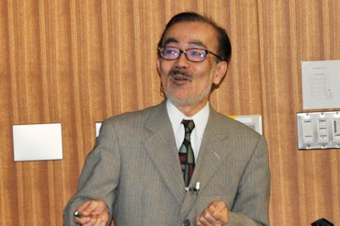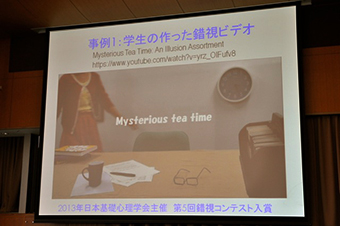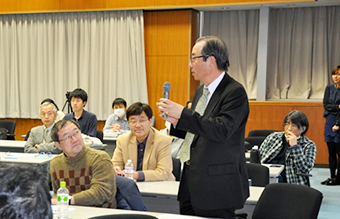Lecture series for the launch of the Institute for Liberal Arts
In line with Tokyo Tech's ongoing education reform, the implementation of the new education system in April 2016 will bring with it the establishment of the Institute for Liberal Arts.
In preparation for this, the working group of the Institute for Liberal Arts is holding a total of seven lectures to examine the Institute's global-oriented approach on liberal arts from various perspectives.
These lectures are for Tokyo Tech graduate students, faculty, and staff, but the fifth lecture of the series was open to the public.
Lecture 5
Project-based learning and the brain function improvement boom
Professor Ichiro Fujita began his lecture by introducing the project-based learning (or problem-based learning, PBL) classes he has conducted at Osaka University's Division of Biophysical Engineering. PBL is a teaching method in which students are faced with real life challenges, must proactively raise questions and learn new skills, and eventually create projects addressing these challenges. PBL also gives emphasis to publicly sharing the final product or performance, which Fujita demonstrated with a video on optical illusions created by students in his class. Fujita's tips for successful PBL generated many ideas among Tokyo Tech faculty and staff members for designing future participatory courses at the Institute for Liberal Arts.

Professor Fujita

The award-winning optical illusion video
created by Fujita's students
In the latter half of his lecture, Fujita talked about a specific PBL case, the "Truths and Myths of the Brain Boom". In the 1990s, brain science rapidly pervaded society, and a so-called brain function improvement boom started. The topic attracted plenty of attention in the press, and unfortunately some information about brain science prevailing in society today is apocryphal. In his research, Fujita examined a brain training case in detail, illustrating the merits and demerits of the brain boom and alerting the public of its realities. Fujita concluded his lecture with valuable suggestions for a sound relationship between science and society.

Discussion after the lecture
The post-lecture question and answer session included many questions from the floor and active discussion between Fujita and the participants. What struck them most was the importance of critical thinking. With so much dubious scientific information surrounding everyone, how can Tokyo Tech students and graduates, with their specialized knowledge, contribute to the betterment of the society? Fujita's lecture served as the impetus for thinking about controversial ethical issues connected to the obtainment and provision of information.
The Institute for Liberal Arts lecture series is supported by the Top Global University Project funded by the Ministry of Education, Culture, Sports, Science and Technology.
Updated on April 24, 2015.
. Any information published on this site will be valid in relation to Science Tokyo.






